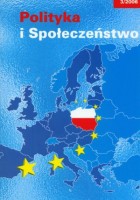
We kindly inform you that, as long as the subject affiliation of our 300.000+ articles is in progress, you might get unsufficient or no results on your third level or second level search. In this case, please broaden your search criteria.

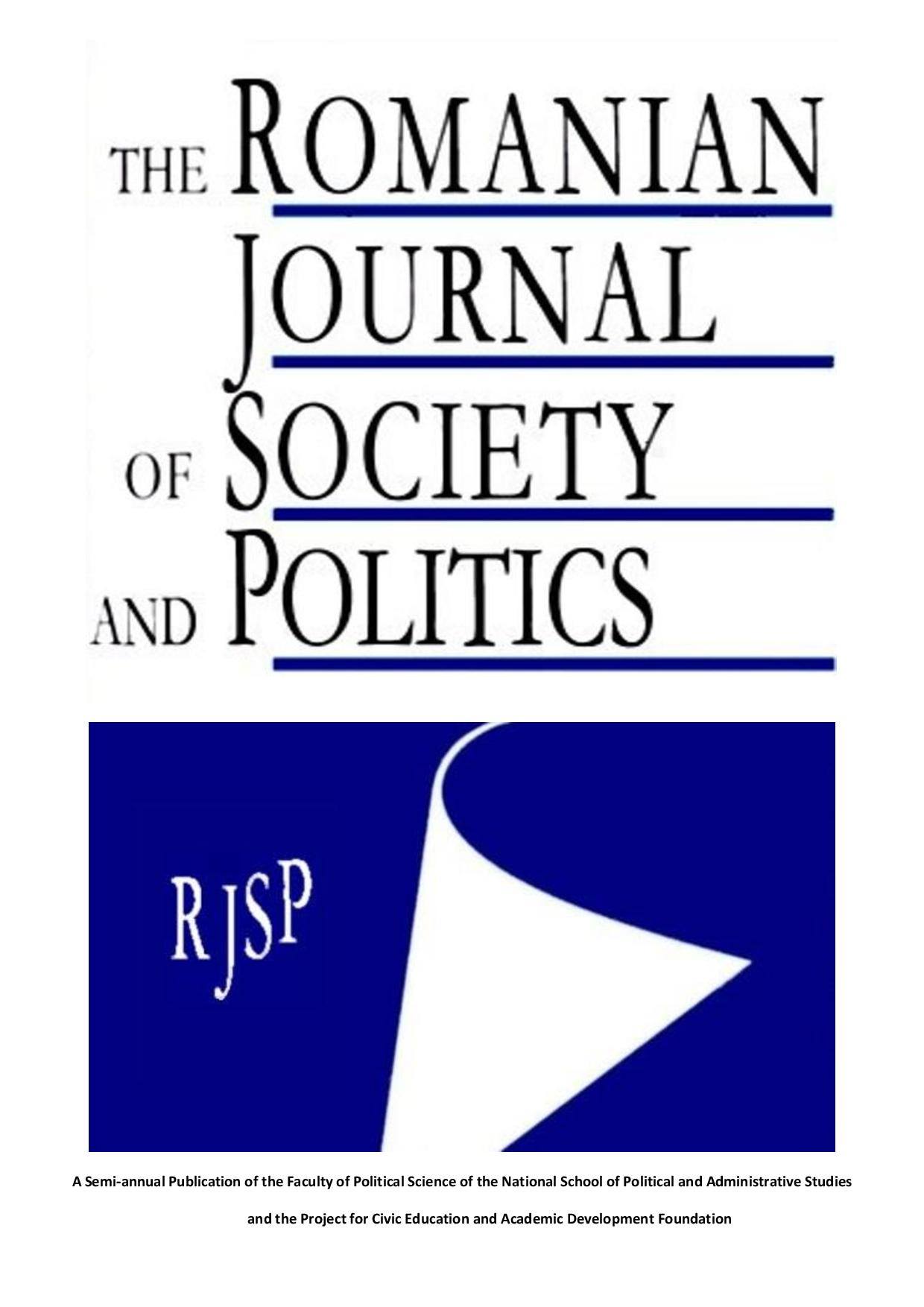
What are the main dimensions of competition between political parties in Romania? Is there a match of the electorate policy preferences with those of political parties? This paper analyzes what are the main dimensions of competition between parties in Romania by looking at the issue preferences of the party in the electorate. We use data obtained from the voting advice application (VAA) applied in 2012 (votulmeu.com) in Romania. Finally we compare our results with Chapel Hill expert party mappings and claim that VAA data are a reliable source for finding out the programmatic peferences of party supporters.
More...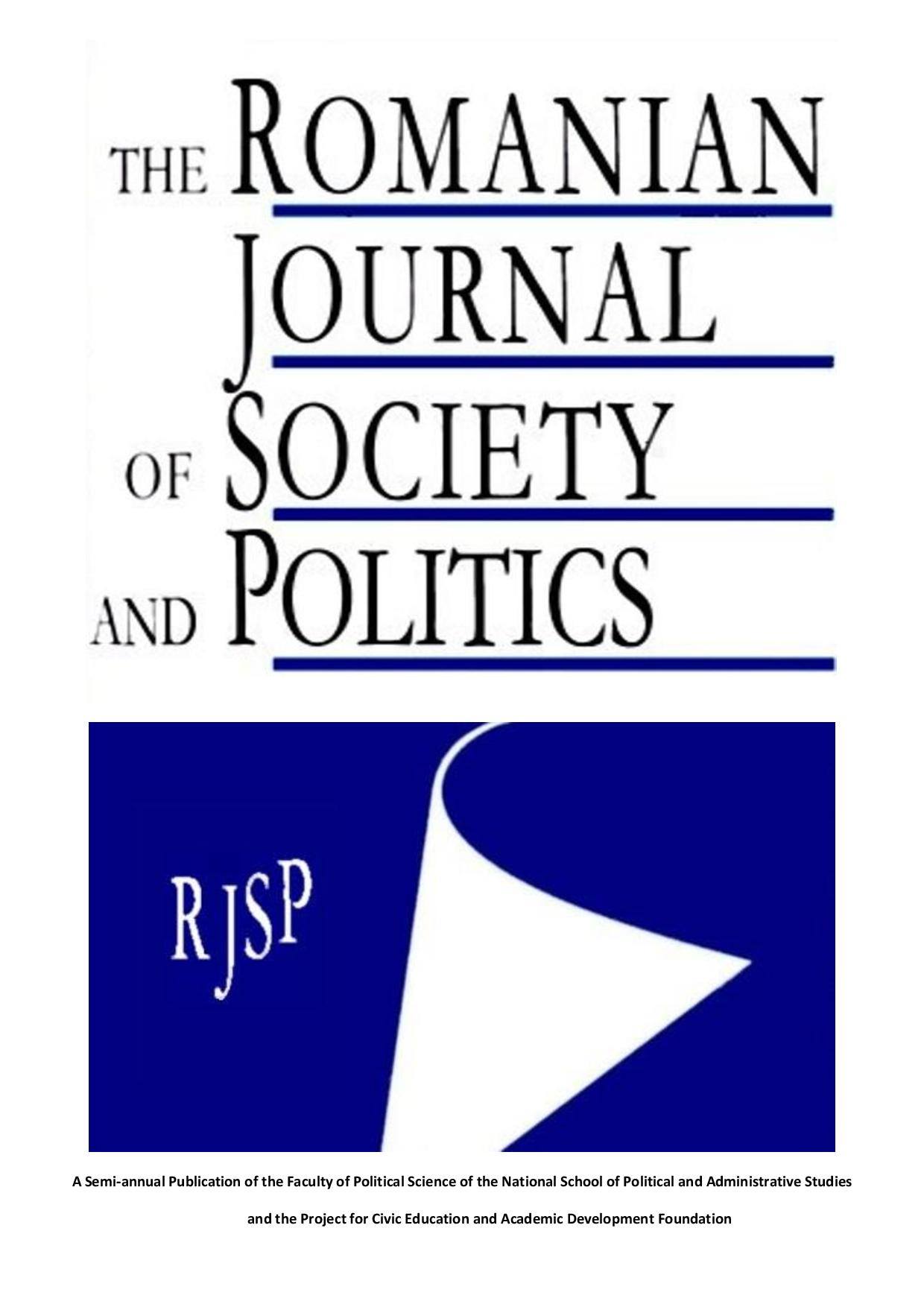
The purpose of this paper is to study the electoral behaviour of the Romanian voters under different voting rules, looking to answer the question regarding the extent to which voting rules matter in the local context. In order to achieve this purpose, I use the results of a pilot field experiment conducted in Bucharest during the local elections, which took place on the 10th of June 2012. Using the experimental results, I aim to answer two types of research questions. The first concerns the extent to which results obtained through different voting rules really differ in a real life setting, and if so, whether it is due only to the aggregation rule or also to a change in electoral behaviour caused by changing the rule. The second one concerns strategic behaviour in particular and aims to see to what extent strategic voting existed in these elections and whether some rules actually encourage strategic voting more than others, as theory predicts.
More...
The paper presents principal methodological approaches to studying party policy positions under the conditions of competitive political regime. It aims to identify the advantages and shortcomings of these approaches. Much attention was given to the theoretical and empirical studies of party policy positions carried out by foreign political scientists. The conclusion was drawn that the analysis of party programs and manifestos is the most appropriate approach to identifying party policy positions. In particular, it helps to set up comprehensive databases of party policy positions, which could be used during further investigations of party positioning and political competition.
More...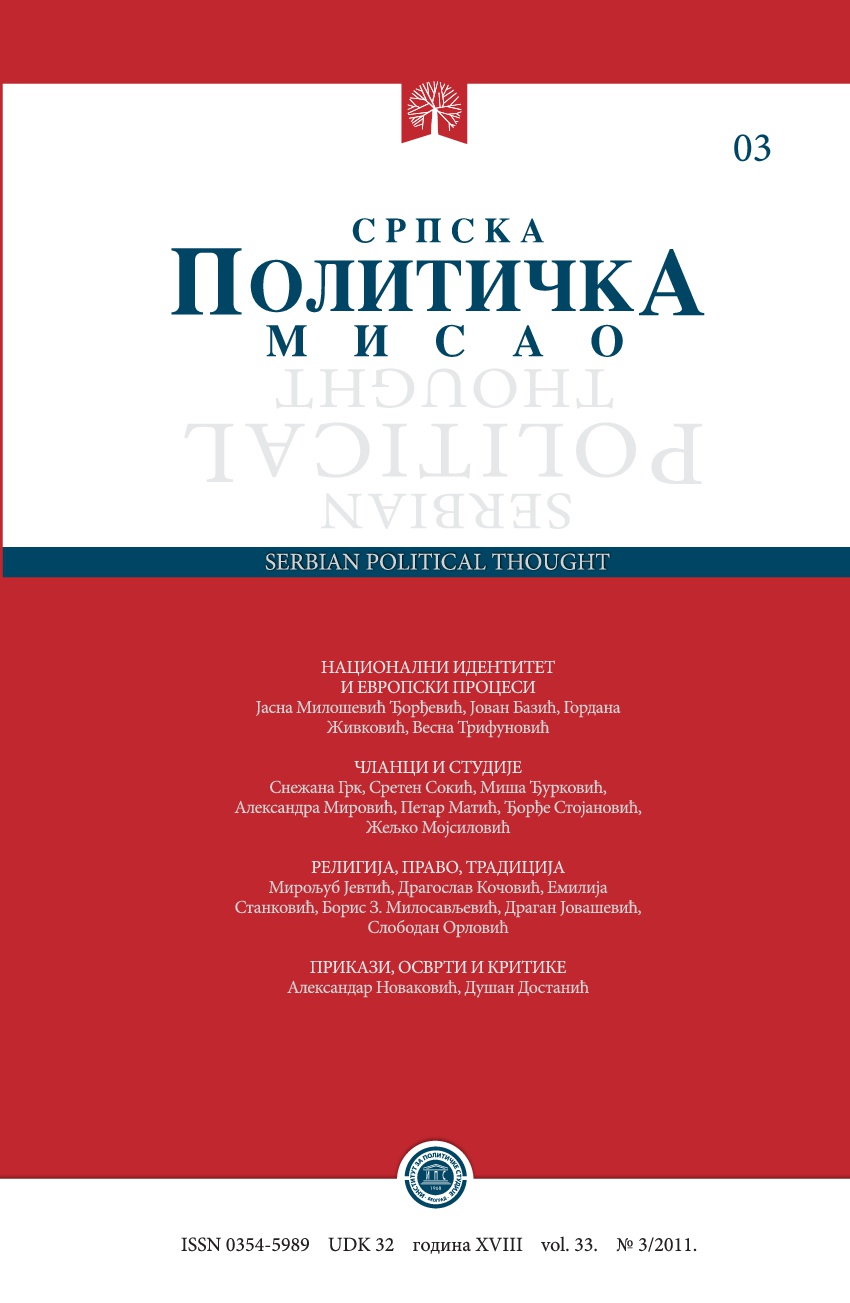
In the article the author analyzes the events from 5th October 2000 in Serbia, their outcome and their various characterizations. It shows that frequent designation of the events as a revolution or an over turn, even as a putsch, is very disputable. Applying the method of analytical testing some important characteristics of these categories on the considered case of Serbia, aims not only to show that it can not find here, and that it is wrong to use the terms, but to mark and set aside essential elements of what is really in this example implemented as a means of political struggle. Exactly, this is an evolutionary strategy of mass civil disobedience. Namely, the force has been a key factor influencing the direction of events, and acting on the very outcome, but it was a potential and latent power reflected in the mass of active citizenship and his expressed readiness to fight, if would be need, with all means for recognition of his electoral will. However, as the scenario of providing active, i.e. right (armed) resistance to the regime was not realized, the protests that took place 5th October has remained at the level of civic struggles for the protection of the existing constitutional order, which was being endangered by then authority itself (so- called the usurpation of legality) in its manner of governance. And this is precisely the key moment which suggests that, despite quasi-democratic conditions, i.e. the lack of that rigid institutional condition stricto sensu, which the dominant Rawlsian conception set as a necessary framework for this kind of practice, the protest actions of the Serbian citizens can still be treated as an acts of civil disobedience. Systemic- institutional context is certainly framework of actors’ behavior. But the social and political activities of citizens are affected by social norms too. In Serbia’s case, just the civil norms of a new political culture emerging have secured the necessary contextual framework for the implementation of the civil disobedience practice. The main conclusion is that the analyzed case of Serbia, as an example of successful implementation of civil disobedience for the democratization of political power, shows how much can be great social capital and strong political forces made by associated disobedient citizens, i.e. how much citizenship’s activity can contribute to both, developing and strengthening the democratic capacity of one society and its political institutions. Therefore, special attention is devoted to analyzing the present state of civil society in Serbia, its unused social and political potentials, and tendencies of marginalization and irresponsible disqualification of civil disobedience practice.
More...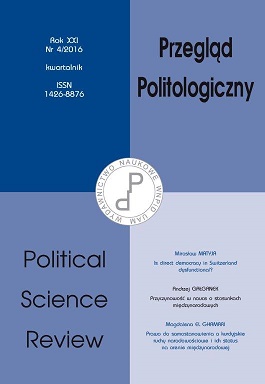
The paper summarizes the nature of Eric Voegelin’s and Leo Strauss’s methodological approaches to the study of the history of political thought, in particular, the Western political thought. The paper concludes that in both cases the thinkers stray away from the mainstream, which is currently represented by contextualism. However, in their dissenting voices both authors take very different routes. Voegelin focuses on political symbols which are grounded in the metaphysical experience of their creators, and Strauss focuses on the perennial question of philosophy and classical, discursive rationality as the criterion of philosophical inquiry. They also differ in their opinions on the role of the political philosopher. For Voegelin, the philosopher is a defender or a co-creator of political creeds. For Strauss s/he is mainly the educator of politically savvy youths and, above all, the defender of philosophy as the most noble pursuit of the mind. The paper concludes by pointing out the importance and prominence of both thinkers.
More...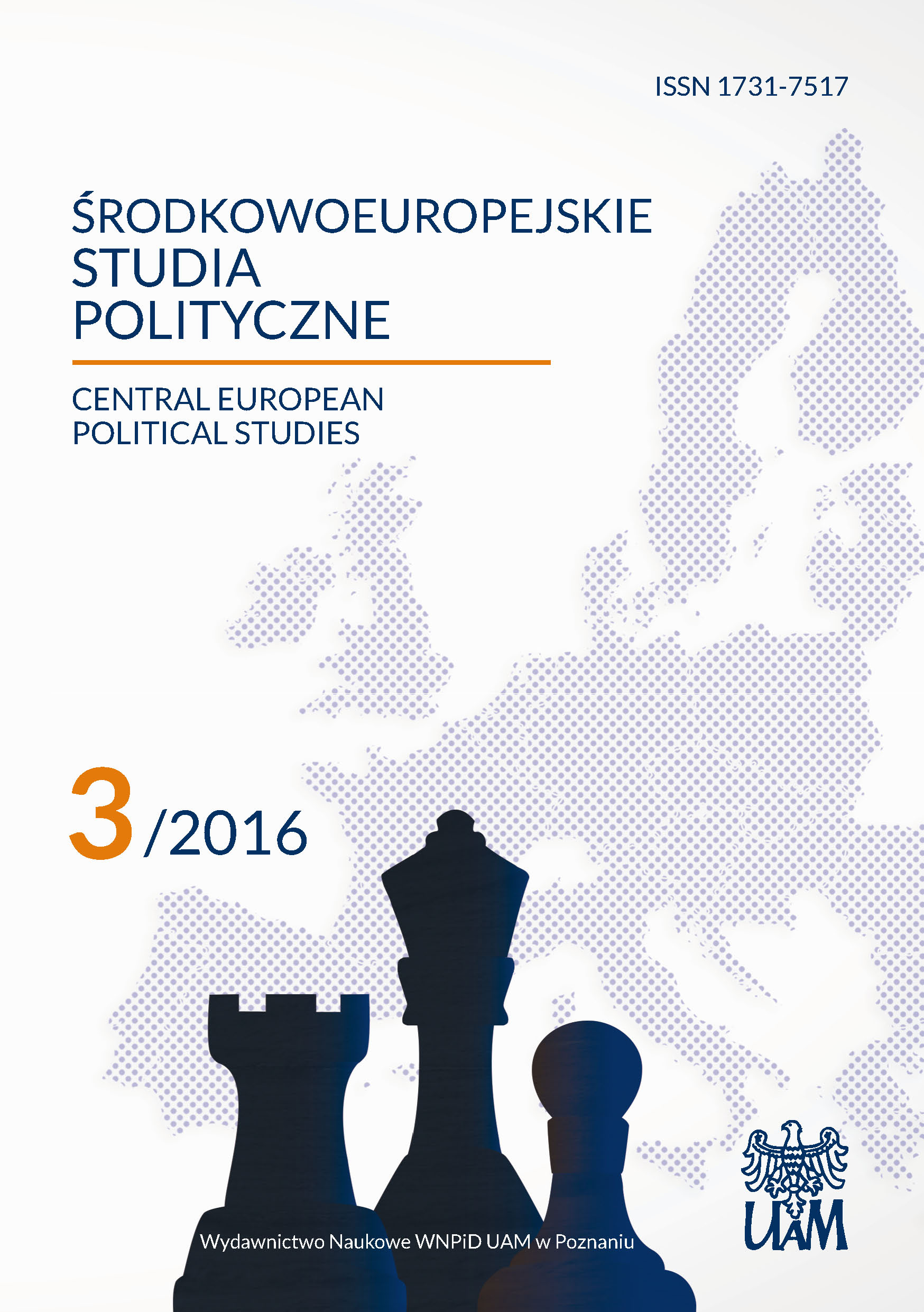
The author of this paper analyzes a specific political fact, namely the inauguration of presidency in modern democratic systems. Focusing on the inauguration of Andrzej Duda’s presidency, the author answers the question of whether this extensive range of activities (encompassing the act of swearing in, symbolical acts, presidential address and other speeches) is an element of a consciously created legitimacy claim made by the president-elect. Answering this question in the affirmative, the author illustrate show the claims that refer to all three of Weber’s types of legitimacy are encompassed in the successive parts of the inauguration: the swearing in refers to the legal element of legitimacy, an extensive range of symbolical acts refers to tradition, whereas the presidential address introduces yet another element justifying legitimacy, this time resulting from the heritage of Lech Kaczyński’s charisma.
More...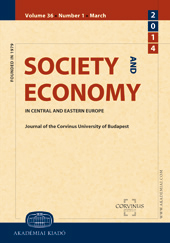
Computer scientists and social scientists consider the political districting problem from different viewpoints. This paper gives an overview of both strands of the literature on districting in which the connections and the differences between the two approaches are highlighted.
More...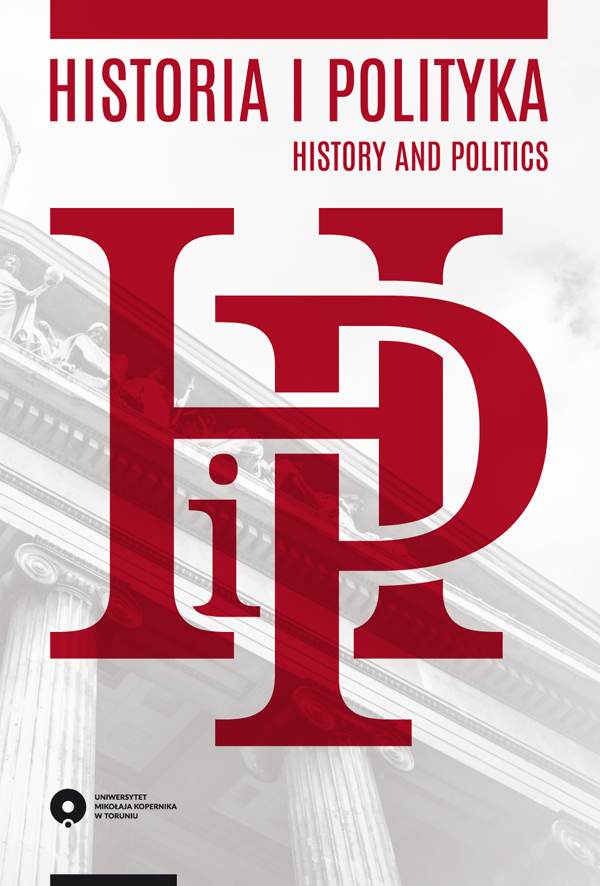
In this article author presents his research (methodological) suggestions concerning the political caricature, considered as the source material for the research on the history of the Second Polish Republic. It is hard to overvalue the role of cari¬cature as an iconographic and visual source. Caricature teaches, warns, amuses, but also creates a catalogue of typical behavior. It can become a weapon in political fight. The author has indicated the following functions of caricature: entertaining, sociological, creating and organizing the socio-political reality, psychological and communicative. Every researcher is entitled to present his own methodological proposals. In author’s opinion, a number of elements can be distinguished in the research on cari¬cature. At first, the sender of the information should be defined - "who speaks?” Secondly, the researcher has to answer the question "what?” and "when?” the caricature says (the content of the information). Thirdly, the question "who does it speak to?” (the receiver of the information) should be asked. The last essential question to be answered is: "What is the result?” (the outcome of this communication process). The issues addressed in Polish political caricatures in the period of the Second Polish Republic, presented a very broad spectrum, ranging from the current domestic policy to the International affairs. We are still waiting for the in-depth and complex analysis of the Polish political caricature (1918-1939).
More...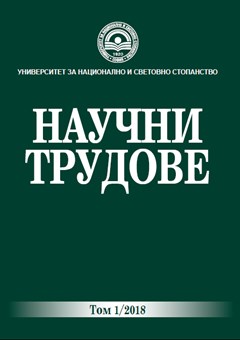
The political and corporate world is becoming increasingly technological, networked and inseparable, which provides and permits interdisciplinary, unlimited and diverse research frameworks and models. This article is an attempt to apply analytical tools from the field of business management and strategic planning for analysis in the field of international relations, diplomacy and everyday policy making. The assumption is that innovation in ideas stems from combining, colliding, merging of existing concepts and cultures and not from hard discipline differentiations.
More...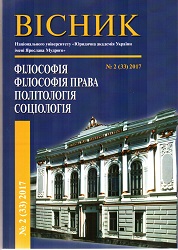
The article explores the semantic content of the concept of «ideology» in the postmodern paradigm and analyzes ideology as an instrument of political action.It is proved that the 20th century has set the task for the European community to solve which is very difficult – to orientate and find oneself in the landscape of absolute worldview freedom, to resist the «terror of complete freedom» (Z. Bauman), because the total pluralism of postmodernity is most clearly manifested in the ideological sphere of social consciousness, where the faith of the Modern Age and the socialist-communist dogma are denied. Humanity is compelled to build its own ontological reality not only materially, but also symbolically – by word and idea. World outlook problems turn into means of political influence.This results in awareness of the need to develop the most comprehensive picture of the world, overcoming the ideological deficit, building a world outlook «foundation», which will ensure the possibility and effectiveness of public consensus, will allow the information of multiple world pictures to the generally accepted model. Humanity finds the way out of this worldview crisis in the topos of ideology, which is designed to try on the coexistence of different worldviews in the conditions of the autonomization of the political sphere.It is argued the thesis that lining around the central mythologeme, ideology is capable of implosion of other, additional, politically significant meanings, thanks to which it is possible to turn the population into an electorate.It is proved that the specificity of ideologies in postmodern conditions is that both left and right ideologies have arhizomatic nature, due to which the emphasis is made depending on the situation or on the conceptual or emotional component, they both are declared substantively equivalent in the intellectual dimension of the political sphere. That is why modern ideology often has a mystifying, illusory character (K. Manngheim), carries out a hidden, non-reflective influence, calls for romantics, and the pragmatists are the first to distribute the results of their struggle.
More...
A problem of nepotism in the modern Ukrainian society is viewed as one of manifestations and powerful sources of corruption which shows itself as practice of placing one’s relatives, acquaintances, friends or persons within a high-ranked individual’s circle to certain offices without regard to their professional skills and training at other people’s expense. It has been underlined that a destructive result of the nepotism’s personnel policies lies in the fact that unfavourable psychological climate is established among the staff, «unhealthy» organizational set-up is formed, basics of teamwork are ruined, and employees who enjoy no protection lose motivation to fulfill their duties properly; as social lifts are broken, young and talented specialists have no opportunities to be promoted, improve their financial and social status, and this causes migration of an able-to-work, highly-trained portion of the population abroad. The above factors decrease work efficiency of employees in certain teams and lead to deterioration of growth indexes and rates of an institution (establishment, organization, etc.) which ceases developing. Attention is drawn to the fact that immorality and unlawfulness of nepotism manifests itself as ignoring interests of a community (society, state), especially at the state and local levels; as interests of merely a small group of people who are linked through family or mental relations; this causes conflicts between family clans in pursuit of domination over that certain area, and tension in the society. It has been emphasized, that Ukrainian officials justifying themselves by the fact that «tradition» of showing favouritism to relatives and friends is rooted in our people’s minds have made a wide use of practice of nepotism and have turned Ukraine to a «state of developed nepotism» for only twenty-five years. Manifestations of corruption with nepotism atop enhance as a number of officials increases, that’s why the size of the officialdom which shall not be greater than that established by the European regulations must be controlled. It has been concluded that in order to overcome the problem of nepotism in the Ukrainian society, these very personnel policies and similar discriminatory practices which are applied to recruitment in the state’s various agencies must be abandoned, and officials must be punished severely for their wrongdoings starting with the top authorities and administration. For that end, bearing in mind experience of advanced states which made success in their struggle against corruptive phenomena, the society and authorities should focus their efforts on activation of anti-corruption bodies’ work and enhancement of control over compliance with requirements of the Ukrainian legislation in force which sets limits on placement of immediate relatives to senior public offices and promotes prevention of corruption. Establishment of anti-corruption mentality in citizens and strong intolerance of public opinion to any sorts and forms of corruption in all spheres of public life shall be facilitated through educational institutions and the mass media on the basis of world-recognized educational standards.
More...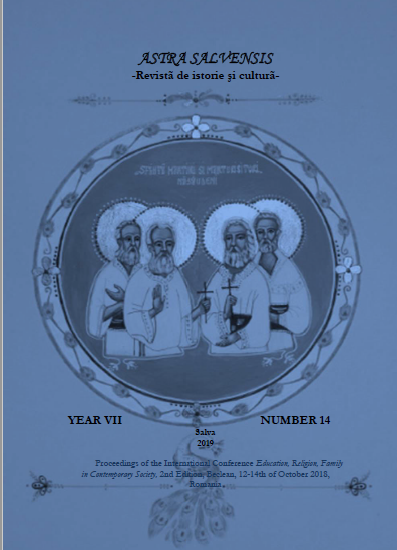
The deconsolidation of democracy is a new phenomenon which is not provided forin the specialized works. This phenomenon was supposed to be unlikely or possible only through acoup d’etat or after a war. But countries such as Poland, Hungary and Romania (in an incipientform) have shown us that functional democracy can be diluted as a cosequence of some controversialpolitical measures. In this study we aim at observing what has happened in these three states and towhat extent deconsolidation of democracy has been possible and especially if this process is a reversibleone. We want to understand if this democratic deconstruction can appear in young democratic states ormay appear at random, irrespective of the democratic tradition present in that state.
More...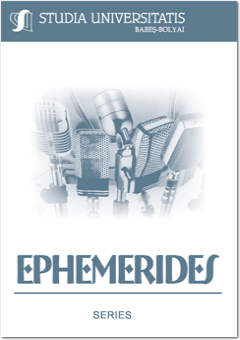
The main purpose of this paper is to investigate the situation with fact checking, the way the journalists follow the principles of ethical codes while providing information to the mass, whether they choose to be led by information published in online platforms by ordinary people, or, on the contrary, to be the frontrunner source of information to the mass, by providing correct information not fake news. For this we analyze the general role of the media in society, the challenges the journalism faces in the digital age, the role of social networks as source of information, situation with breaking news, ethical challenges journalism is facing in the digital age, cases of fake news with harmful impact, the role of journalists in the digital age. And as a result of analyzed we came to the opinion that these days it is very important for the society to see the quality news written by professional journalists with true fact.
More...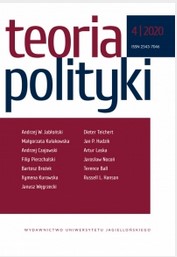
Interpretive International Relations (IR) has become a robust and diverse research programme, consolidating across various subfields of the discipline. However, this is a recent phenomenon. While early classical realists and English School scholars clearly drew on interpretive thought, these contributions did not coalesce into a well defined and specifically interpretive research agenda. The ‘interpretive turn’ in social sciences and humanities in the 1970s and epistemological pluralisation of political science and IR in the 1990s slowly made space for interpretive theory and research. This paper reconstructs, first, what makes interpretive IR distinct, and, second, what it means to engage in interpretive inquiry in this field, conceptually and substantively. It discusses in particular the implications of the monist ontological position that interpretivists tend to occupy and the conditions of knowledge production within the hermeneutical circle. These reject the possibility of transcending the context and bring to bear the researcher’s involvement in knowledge production as inevitable but generative. The paper also explicates the still poorly understood concept of ‘intersubjectivity’ as being defining for the interpretivist sensibility and one which directly contests positivist ideals. Interpretive IR scholarship serves as a veritable showcase for interpretive research practice, and points to the growing significance and volume of such scholarship.
More...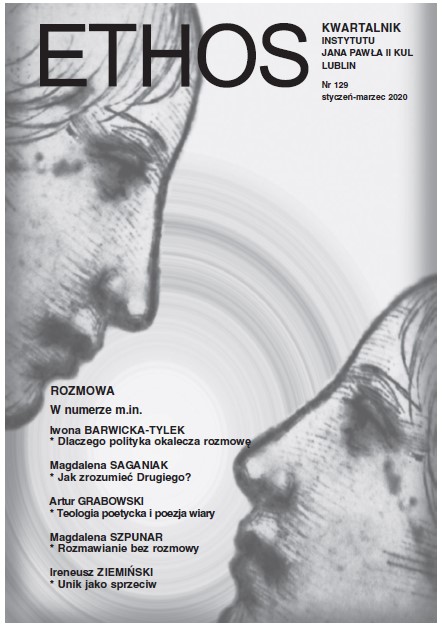
Contemporary political discourse often refers to dialogue and conversation as an important, if not the most important, element of a healthy democracy. Improving communication between public authorities and citizens, as well as between citizens themselves, is the goal of numerous practical democratic innovations. In the article, the historical perspective is used to argue that there is at least one obstacle which impedes a reliable democratic dialogue. The obstacle in question is the loss of dialectical competence, the causes of which I analyze referring to ancient philosophical debates on the role of the word in politics. Dialectic had been seen as the art of wise conversation since antiquity, but it soon fell victim to intellectual battles among philosophers, who saw it, at best, as a method of reaching the truth, and sophists, for whom dialectic was mainly a tool to creatively manipulate opinions of others. The unique political value of dialectic had been neglected over time and thus the dialogue itself became mutilated: deprived of the important prefix ‘dia-’ and reduced to the possibility of mere articulation of one’s opinions and interests. I argue that the restoration of genuine dialogue in a democracy requires a deeper understanding of the nature of dialectical opinions engaged in political conversation, and the correct application of the dialectical method in the Aristotelian sense of the term.
More...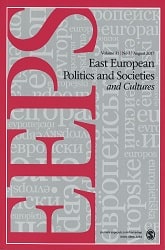
The article sets off from a discussion of some methodological and theoretical issues pertinent to the study of ideological and institutional transfer between “centre” and “periphery” in nineteenth-century Europe. While taking into account the asymmetry in radiation and reception, it probes into the (Balkan) periphery’s political and cultural agency in reformulating and re-institutionalizing the “western model.” Rather than simply tracing movements, flows and circulation – the conventional concern of the transnational approach – the focus is on studying the transformations which occur in the process. This makes it possible to highlight the dynamics and versatility of ideational and institutional selection, interpretation, adaptation and transformation (or subversion) – in brief, the process of re-signification of ideas and institutions. The article then proceeds by exemplifying this approach in two directions. First, it examines several main channels and agents of transfer to and within the Balkan periphery illuminative of the ways ideas, practices and institutions traveled and mutated in the course of their journey; second, it surveys several characteristic instances of transfer of liberal ideas and institutions in the Balkans focusing on their legitimization and “domestication” which underscore the semantic and functional reinterpretations of modernity and tradition in the process.
More...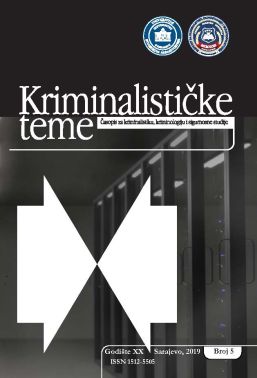
Uobičajeno kad govorimo o sajber sigurnosti (prevedeno kao kompjuterska sigurnost sa uticajem u sajber prostoru), mislimo na hakerske napade na kompjuterske sisteme ili na sigurnost podataka, pojedinih informacija, ličnih podataka i informacija. U ovom radu naš cilj je da otvorimo jedno uslovno rečeno novo pitanje sajber sigurnosti, a koje se odnosi na metodologiju istraživanja političkih i sigurnosnih pojava sa aspekta naučnog pristupa i koriščenje suvremene kompjuterske tehnologije u kreiranju percepcije javnosti. Svakako da kreirana percepcija javnosti jeste i kreriranje javnog mnjenja, a to utiče na kretanje u društvu, ili kreiranje sigurnosne politike. Pristup metodologije istraživanja političkih i sigurnosnih nauka i njihovo prevođenje u praksi veoma često se svodi na političku pragmu sa kojom se manipuliše u okviru naučne zasnovanosti prikazanih rezultata o društvenim kretanjima ili najviše u odnosu na percepciju sigurnosnih prijetnji i izazova. Jedan takav primer uslovljavanja kreiranja sigurnosne politike jeste „sekuritizacija“ sigurnosnih problema kroz stvaranje percepcije javnosti kao uslov sekuritizacije. Sigurno da se ova percepcija ne može isključiti u odnosu na kreiranje javne komunikacije ili medija, ali smatramo da osnov upravo potkrepljivanja takvih stavova i percepcija jeste naučna potpora dobivenih rezultata. Veoma interesantan pristup koji ćemo pokušati da otvorimo kao dilemu u ovom radu, jeste pristup u mjerenju laži u politici povezanih sa realnosti sigurnosnih ugrožavanja društva. Upravo prikazivanje ove realnosti i poticanje lažnih informacija jeste deo kreiranja javne percepcije o sigurnosti, a tome pridonosi sajber prostor kao glavni medij suvremenih društava i kreiranju percepcije građana o sigurnosti na svim nivoima.
More...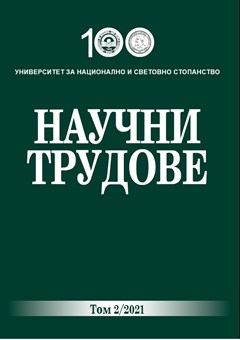
The article discusses some methodological issues in the study of interests and values in the philosophical and political science literature. An overview of the understanding of the nature and peculiarities of interests and values is made. An answer is sought to the question of their current understanding. Special emphasis is placed on the problem of the specifics of political interests and values and their role in the political process.
More...